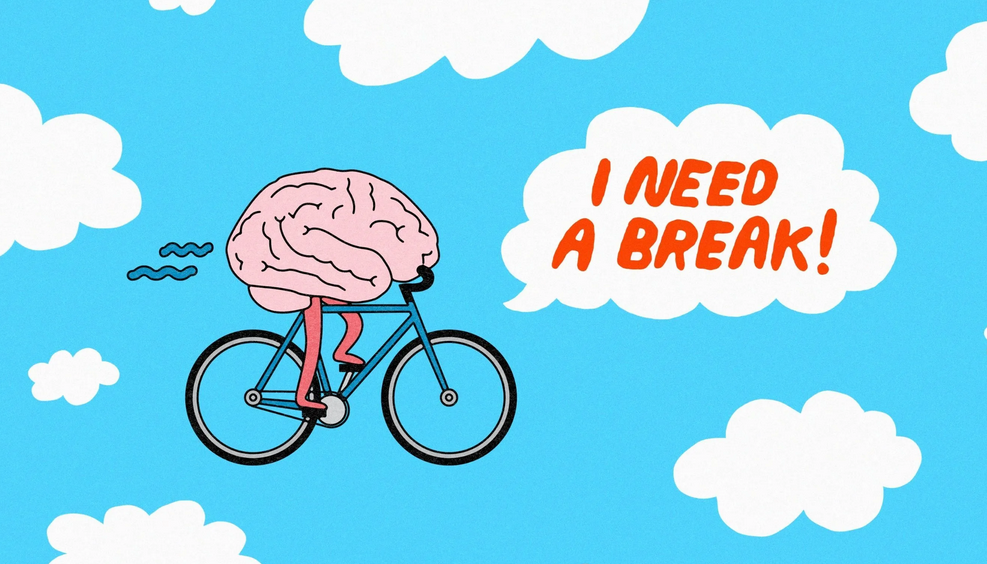

In today’s fast-paced world, where multitasking and non-stop productivity often feel like the norms, the concept of taking breaks can seem counterintuitive. However, research and practical experience both suggest that strategic breaks can significantly enhance cognitive wellbeing and improve study effectiveness. Let’s delve into why breaks matter, how they work, and how to implement them for maximum benefit.
When you engage in a prolonged period of study or intense mental activity, your brain accumulates cognitive load. Cognitive load refers to
the amount of working memory resources required to complete a task. As this load increases, mental fatigue sets in, making it harder to
focus and process information. Breaks help manage and reduce cognitive load, allowing your brain to reset and function more effectively.
The brain operates using different networks depending on the task at hand. The Default Mode Network (DMN) becomes active when you're not
focused on the outside world, such as during daydreaming or resting. Studies have shown that this network plays a crucial role in creativity
and problem-solving. Taking breaks can activate the DMN, giving your brain the chance to process information subconsciously and generate new
ideas.
Breaks also support neuroplasticity, which is the brain's ability to reorganize itself by forming new neural connections. By interspersing
study sessions with breaks, you allow your brain to consolidate and integrate new information. This can enhance long-term retention and
understanding of the material.
The Pomodoro Technique is a popular method for incorporating short breaks into study sessions. This technique involves
working for 25 minutes followed by a 5-minute break. Research suggests that short breaks can help maintain focus and prevent burnout by
keeping mental energy levels consistent.
Longer breaks, such as a lunch break or a 30-minute walk, offer deeper cognitive and physical benefits. These breaks allow you to fully
disengage from your work and return with renewed energy and focus.
Engaging in physical activities during breaks, such as stretching, walking, or exercising, can enhance both mental and physical health.
Exercise increases blood flow to the brain, which can improve cognitive function and mood.
Mindfulness practices, such as meditation or deep-breathing exercises, can be integrated into your breaks to promote mental clarity and
reduce stress. These practices help calm the mind and enhance focus when you return to studying.
To make the most of your breaks, plan them strategically. Use techniques like the Pomodoro Technique to structure your study sessions and
incorporate breaks. Make sure to schedule longer breaks throughout the day to avoid prolonged periods of uninterrupted work.
Select break activities that truly refresh and rejuvenate you. This might include physical exercise, a short walk, a relaxing hobby, or
mindfulness practices. Avoid activities that can lead to distractions or prolong your break, such as browsing social media.
Pay attention to signs of mental fatigue or stress. If you find your focus waning, it might be time for a break. Conversely, if you’re
deeply engaged and feel productive, it might be beneficial to extend your study session before taking a break.
Establishing a routine for breaks can help make them a regular part of your study habits. Consistency in taking breaks helps train your
brain to expect them, leading to better overall productivity and cognitive wellbeing.
Incorporating breaks into your study routine is not a luxury but a necessity for maintaining cognitive wellbeing and enhancing study
effectiveness. By understanding the science behind breaks and implementing effective strategies, you can improve focus, reduce stress, and
boost overall productivity. Remember, taking a step back is often the best way to move forward effectively. So next time you dive into a
study session, make sure to give yourself permission to take regular, purposeful breaks—they’re an investment in your success.
Click read more to see how the NSW department of Education incorporates brain breaks into their best practices.
Follow our social media posts for regular updates on all things Full Spectrum Education!
Linkedin: https://www.linkedin.com/company/18361706/
Facebook: https://www.facebook.com/fullspectrumeducation/
Youtube: https://www.youtube.com/channel/UCgnnLc8w9Z_qVAcqmkm_Ryg
Spotify: https://podcasters.spotify.com/pod/show/fullspectrumeducation
X: https://x.com/fseduau